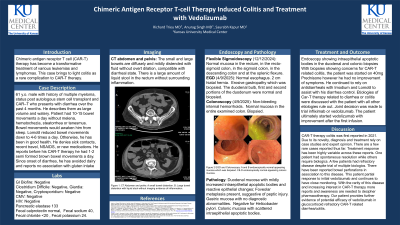Tuesday Poster Session
Category: Colon
P4724 - Chimeric Antigen Receptor T-Cell Therapy Induced Enterocolitis and Treatment with Vedolizumab

- RT
Richard Trieu, MD
University of Kansas Medical Center
Kansas City, MO
Presenting Author(s)
1University of Kansas Medical Center, Kansas City, MO; 2University of Kansas Medical Center, Kansas CIty, KS; 3University of Kansas Medical Center, Kansas City, KS
Introduction:
Chimeric antigen receptor T cell (CAR-T) therapy has become a transformative treatment for various leukemias and lymphomas. This case report aims to highlight colitis as a rare complication of CAR-T therapy.
Case Description/Methods:
61 y.o. male with a history of multiple myeloma treated with autologous stem cell transplant and CAR–T. He developed diarrhea over the past 4 months with 10-15 large-volume watery bowel movements daily. He denies GI bleeding, steatorrhea, or tenesmus. He reports that before his CAR-T therapy, he had 1-2 formed bowel movements a day. He denies sick contacts, travel, NSAIDS, dairy, new medications, or association with gluten intake. GI Biofire, c diff, Giardia, Cryptosporidium, CMV, and HIV were negative. Fecal fat, sodium, chloride, potassium, and elastase were normal.
CT abdomen and pelvis: diffusely and mildly distended small and large bowels without surrounding inflammation.
EGD: The esophagus, stomach, and duodenum were normal.
Colonoscopy: Normal colonic mucosa.
Pathology: Duodenal mucosa with increased intraepithelial apoptotic bodies and reactive epithelial changes. Colonic mucosa with scattered intraepithelial apoptotic bodies
With biopsies concerning for CAR-T related colitis and common etiologies ruled out, 40mg prednisone was started with no improvement. The patient started vedolizumab with partial clinical improvement after the first infusion.
Discussion:
CAR-T therapy colitis was first reported in 2021. Due to its novelty, diagnosis and treatment rely on case studies and expert opinion. There are a few rare cases reported thus far. Treatment response has been highly variable across these reports. One patient had spontaneous resolution, while others required biologics. A few patients had refractory disease despite a trial of multiple biologics. There have been reported bowel perforations in association with this disease. This patient had a partial response to initial vedolizumab and continues to have close monitoring. With the rarity of this disease and increasing interest in CAR-T therapy, more reports and awareness are needed to decipher pharmacotherapy. Our patient provides further evidence of the potential efficacy of vedolizumab in glucocorticoid-refractory CAR-T-related diarrhea/colitis.
Disclosures:
Richard Trieu, MD1, Anurag Singh, MD2, Saurabh Kapur, MD3. P4724 - Chimeric Antigen Receptor T-Cell Therapy Induced Enterocolitis and Treatment with Vedolizumab, ACG 2025 Annual Scientific Meeting Abstracts. Phoenix, AZ: American College of Gastroenterology.
